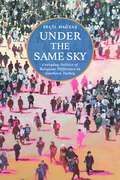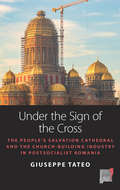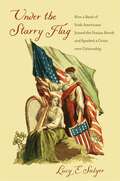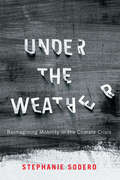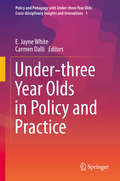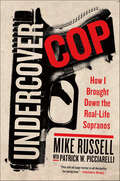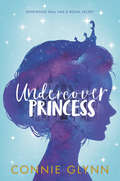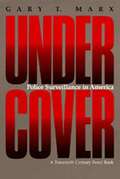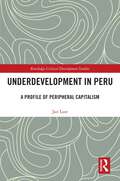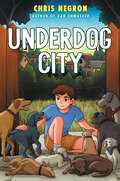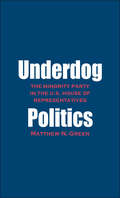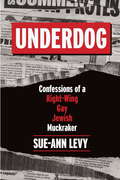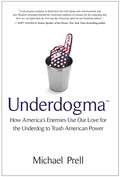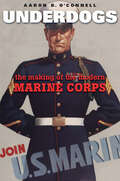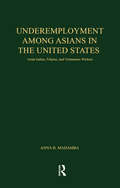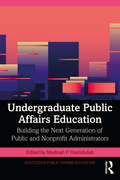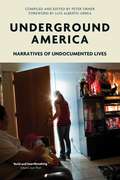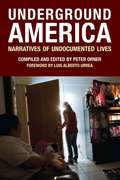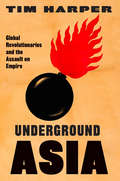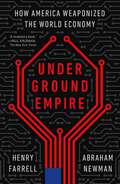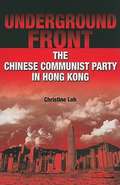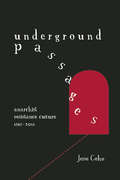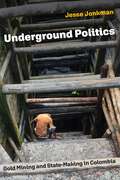- Table View
- List View
Under the Same Sky: Everyday Politics of Religious Difference in Southern Turkey
by Seçil DaǧtașAn ethnographic study of the everyday lives of religious minorities near Turkey’s border with SyriaHow do people coexist in a world shaped by longstanding differences, political instability, and recurrent displacement? In Under the Same Sky, Seçil Daǧtaș addresses this question by exploring the everyday politics of religious difference among minority communities in Turkey’s southern borderlands.In a region often portrayed through the lens of conflict and division, this ethnography brings to life the subtle, often overlooked negotiations occurring in social spaces such as bustling city bazaars, shared worship sites, interfaith unions, home gatherings, and a multireligious choir. Set against the backdrop of major political upheavals in Turkey and Syria before the 2023 earthquakes devastated the region, the book demonstrates how Arab ‘Alawis, Christians, and Jews, alongside their Sunni Muslim neighbors, use familiar social idioms—kinship, hospitality, love, and companionship—to reproduce religious differences.Daǧtaș argues that religious difference is more than an identity marker for these communities, as it is often treated in studies focused on statecraft or political movements. It is a dynamic aspect of social relations which is constantly redefined by race, class, citizenship, and gender, and unsettled by overlapping practices and multireligious belonging. Under the Same Sky focuses on religious difference as lived and reworked in daily encounters—within the larger context of a majoritarian Turkish Sunni state—inviting readers to reconsider secularism, religious plurality, and the nature of political life.
Under the Sign of the Cross: The People’s Salvation Cathedral and the Church-Building Industry in Postsocialist Romania (Space and Place #18)
by Giuseppe TateoBased on extensive ethnographic research, this book delves into the thriving industry of religious infrastructure in Romania, where 4,000 Orthodox churches and cathedrals have been built in three decades. Following the construction of the world’s highest Orthodox cathedral in Bucharest, the book brings together sociological and anthropological scholarship on eastern Christianity, secularization, urban change and nationalism. Reading postsocialism through the prism of religious change, the author argues that the emergence of political, entrepreneurial and intellectual figures after 1990 has happened ‘under the sign of the cross’.
Under the Starry Flag: How a Ban of Irish Americans Joined the Fenian Revolt and Sparked a Crisis over Citizenship
by Lucy E. SalyerIn 1867 forty Irish-Americans sailed for Ireland to fight against British rule. Claiming that emigrants to America remained British citizens, authorities arrested the men for treason, sparking a crisis and trial that dragged the U.S. and Britain to the brink of war. Lucy Salyer recounts this gripping tale, a prelude to today’s immigration battles.
Under the Weather: Reimagining Mobility in the Climate Crisis (McGill-Queen's/Brian Mulroney Institute of Government Studies in Leadership, Public Policy, and Governance)
by Stephanie SoderoHumans and human mobility, including driving and flying, are entangled with the climate emergency. Fossil-fuelled mobility worsens severe weather, and in turn, severe weather disrupts human mobility. A shift to zero-emission vehicles is critical but insufficient to repair the damage or prepare communities for the coming disruptions severe weather will bring. In Under the Weather Stephanie Sodero explores the intersection between human mobility and severe weather. Anchored in two Atlantic Canadian hurricane case studies, Hurricane Juan in Mi'kma'ki/Nova Scotia in 2003 and Hurricane Igor in Ktaqmkuk/Newfoundland in 2010, the book contributes to contemporary cultural and policy discussions by offering five practical recommendations – revolutionize mobility, prioritize vital mobility of medical goods and services, embrace ecological mobilities, rebrand redundancy, and think flexibly – for how mobility can be reimagined to work with, rather than against, the climate in ways that also benefit the health, education, and economy of local communities. This ecological approach to mobilities sheds light on extreme mobility dependency and the impact of mobility disruptions on the ground in Canadian communities.Focusing on the entangled relationship between human mobility and the climate, Under the Weather examines how communities can transform their relationship with mobility to enable greater resilience.
Under-three Year Olds in Policy and Practice (Policy and Pedagogy with Under-three Year Olds: Cross-disciplinary Insights and Innovations)
by Carmen Dalli E. Jayne WhiteThe first book in the series Policy and Pedagogy with Under-three year olds: Cross Disciplinary insights and innovations establishes a path for the much-needed examination of the experiences of infants and toddlers in contemporary educational settings across the globe. Bringing together internationally renowned scholars in the field, it starts a series of discussions about the positioning of under-three year olds in contemporary practice and policy contexts. It takes an in-depth look at what this means for our understanding of under-three year olds and those who share their worlds. Featuring some of the most important contemporary topics in this pedagogical domain, such as care, well-being, belonging, professionalism and status, the contributors offer a kaleidoscope of perspectives for contemplating the new normality of very young children living their lives in group-based early childhood settings, and what gives rise to their current realities. It also explores some important policy directions and trends.
Undercover Cop: How I Brought Down the Real-Life Sopranos
by Mike Russell Patrick W. Picciarelli“Nobody did undercover better than Mike Russell. His story is grittier than The Sopranos, more volatile than Goodfellas. A must read.” —George Anastasia, New York Times–bestselling authorNearly taken out of the game by a shooting, New Jersey state trooper Mike Russell eventually found himself in the right place at the right time to save Andy Gerardo, one of the ranking captains of the Genovese crime family, from an attack. Quickly earning the trust of his new friend, Russell would orchestrate one of the biggest Mafia takedowns of all time.Urged by his police handlers, Russell used his cover story—an ex-cop fired for excessive force who now made his living from an oil-delivery business—and street skills to assimilate into the Genovese crime family in New Jersey, ultimately leading to more than fifty arrests of mobsters, corrupt prison officials, and even a state senator. Straddling the thin line between collecting evidence and participating in the very crimes he was leaking to the cops, Russell consistently placed himself at risk—especially when his police handlers disregarded his wishes and his well-being, conducting premature raids on the gangsters. With his marriage suffering and his family in danger, Russell took extraordinary steps to ensure his financial security and safety, demanding better terms from the police and allowing a film crew to document the final moments of the epic bust for a documentary that was later sold to HBO.A real-life version of The Sopranos, Undercover Cop immerses readers in the colorful yet harrowing trials of a standout cop who faced the mob on his own terms, crippled organized crime in New Jersey, and forever redefined undercover law enforcement.
Undercover Princess (Rosewood Chronicles Ser. #1)
by Connie GlynnPerfect for fans of Meg Cabot and Shannon Hale, Undercover Princess is a charming royal adventure by YouTube star Connie Glynn (Noodlerella). Lottie Pumpkin is an ordinary girl who has spent her life longing for the extraordinary.Ellie Wolf is the crown princess of Maradova, who wants nothing more than a chance at an ordinary life.When fate puts Lottie and Ellie in the same dorm room at the prestigious Rosewood Hall, there’s only one solution: for the girls to swap identities, and live the lives they’ve always dreamed of.But at Rosewood, a secret never stays secret for long. Someone in the school is on to them—and if the truth is revealed, the results may be more treacherous than they ever expected.Undercover Princess is the first book in the Rosewood Chronicles series.
Undercover: Police Surveillance in America
by Gary T. MarxProviding a rich picture of past and present undercover work, and drawing on unpublished documents and interviews with the FBI and local police, this penetrating study examines the variety of undercover operations and the ethical issues and empirical assumptions raised when the state officially sanctions deception and trickery and allows its agents to participate in crime. 'Gary Marx's excellent new book ... shines a strong, unflinching light on the full array of human and political consequences that ensue when law-enforcement resorts to masquerade.' -James B. Rule, Dissent.
Underdevelopment in Peru: A Profile of Peripheral Capitalism (Routledge Critical Development Studies)
by Jan LustAt a time when Peru continues to reel from the impact of Covid-19 and the eruption of corruption scandals involving five former presidents, this book analyzes the persistence and the structural underpinnings of underdevelopment in Peru. During the commodities boom of 2004–2011, Peru experienced strong levels of economic growth, bringing poverty down and increasing the middle-class population. In the Covid-19 pandemic, however, the severe lack of structural economic and social improvements has been exposed. With the arrival of the pandemic, hospitals collapsed, oxygen supplies dwindled, and informality rose, with dire consequences for the vulnerable, and for those already working on subsistence wages. Delving into the history of the country, Jan Lust outlines the structural problems that came about following Peru’s post-colonial entrance into the world economy and the subsequent neoliberal extractive development model adopted in the 1990s. Only by understanding Peru’s specific political, economic, and social conditions can a path towards development be found. This book will be of interest to researchers working within politics, economics, critical development studies, and Latin American studies.
Underdog City
by Chris NegronFrom the acclaimed author of The Last Super Chef and Dan Unmasked comes a heartfelt standalone novel about community, justice, and redemption, perfect for fans of Take Back the Block and Brave Like That.Mortimer Bray is not okay.It seems like everything in his life is changing for the worse. After his own much-loved dog dies, he can’t bring himself to carry on with his dog-walking business; there’s a strange new girl who’s moved into the house next door; and suddenly there’s a buzzing feeling of anxiety in his head and heart when he’s faced with something new.His neighborhood, Townsend Heights, used to feel like the most comfortable place in the world. But lately, it seems like everyone is arguing, and there’s uncertainty around every corner.The neighborhood's only vacant lot is somehow behind it all, Mortimer is sure of that much. If he can unearth the lot's secret history, he just might stop the Heights from unraveling completely.Mortimer can’t save Townsend Heights on his own. But when it comes to community, you’re never truly on your own—not as long as you’re willing to learn from the past, in order to do better in the future.
Underdog Politics
by Matthew N. GreenFollowing its publication in 1974, Grant Gilmore's compact portrait of the development of American law from the eighteenth century to the mid-twentieth century became a classic. In this new edition, the portrait is brought up to date with a new chapter by Philip Bobbitt that surveys the trajectory of American law since the original publication. Bobbitt also provides a Foreword on Gilmore and the celebrated lectures that inspired The Ages of American Law. "Sharp, opinionated, and as pungent as cheddar. "#151;New Republic "This book has the engaging qualities of good table talk among a group of sophisticated and educated friends#151;given body by broad learning and a keen imagination and spiced with wit. "#151;Willard Hurst
Underdog Politics
by Matthew N. GreenIn the first comprehensive study of the subject in decades, political scholar Matthew Green disputes the conventional belief that the minority party in the U.S. House of Representatives is an unimportant political player. Examining the record of the House minority party from 1970 to the present, and drawing from a wide range of quantitative and qualitative data, Green shows how and why the minority seeks to influence legislative and political outcomes and demonstrates that the party's efforts can succeed. The result is a fascinating appreciation of what the House minority can do and why it does it, providing readers with new insights into the workings of this famously contentious legislative chamber.
Underdog: Confessions of a Right-Wing Gay Jewish Muckraker
by Sue-Ann LevyHold onto your hats: popular and controversial Toronto city journalist Sue-Ann Levy -- a self-described nice, chubby, Jewish, gay, conservative girl -- takes on the establishment and establishment thinking in this provocative, honest, and insightful memoir that will surprise her fans and foes alike.Sue-Ann Levy was born to a traditional patriarchal Jewish family in which the son was considered accomplished simply for being born, and she realized from an early age that she would not fit into the mold designated for her. An outspoken, right-wing lipstick lesbian, Levy has spent her life challenging the status quo -- from championing the underdog, to taking on the Liberal left, to running as the first openly gay candidate for the Ontario Progressive Conservative party in 2009. Underdog chronicles Levy's journey through Toronto politics with the same candid, humorous, and self-deprecating approach for which she has become famous for in her daily columns. Persuasive and timely, Sue-Ann Levy will inspire readers to speak up against the inequalities in our political and justice systems.
Underdogma: How America's Enemies Use Our Love for the Underdog to Trash American Power
by Michael Prell&“Analyzing and refuting the common assumptions of anti-Americanism is a critical contribution to the global political debate. Thank goodness for this effort." —UN Ambassador John Bolton, author of Surrender is Not an Option David versus Goliath, the American Revolutionaries, "The Little Engine That Could," Team USA's "Miracle on Ice," the Star Wars Rebel Alliance, Rocky Balboa, the Jamaican bobsled team and the meek inheriting the Earth. Everyone, it seems, loves an underdog. Why is that? We begin life tiny and helpless, at the mercy of those who are bigger and more powerful than us: parents and guardians who tell us what to eat, what to wear, how to behave (even when to sleep and wake up). From childhood into adulthood, we're told what to do by those who wield more power—our parents, teachers, bosses government. So naturally, we have a predisposition to resent the overdogs and root for the little guy. But this tendency, which international political consultant and human rights activist Michael Prell calls &“underdogma," can be very dangerous – both to America and to the world at large. In Underdogma, Prell, who has worked world leaders including Israeli Prime Minister Benjamin Netanyahu, the Australian and Canadian prime ministers and the Dalai Lama, explores our love/hate relationship with power within our culture and our politics. Underdogma explains seeming mysteries such as why: Almost half of Americans blamed President Bush for the attacks of 9/11, even while the American media described the architect of these attacks as &“thoughtful about his cause and craft" and &“folksy." Gays and lesbians protest those who protect gay rights (America, Israel), while championing those who outlaw and execute homosexuals (Palestine). Environmentalists focus their rage on America, even though China is the largest emitter of greenhouse gases. The United Nations elevates countries such as Sudan to full membership on the UN's Commission on Human Rights, even as the ethnic cleansing of Darfur proceeds. Tracing the evolution of this belief system through human history—ancient Greece to Marxism to the dawn of political correctness—Prell shows what continuing with this collective mindset means for our future. While America and its president increasingly exalt the meek and apologize for their power, America's competitors and enemies are moving in a different direction. China is projected to overtake the U.S. economically by 2027 and is ready to move into the position of hegemon, and radical Islamists are looking to extend their global territory, taking any sign of weakness as a chance to attack. America must return to its founding spirit, and underdogma must stop now—our nation depends on it.
Underdogs: The Making of the Modern Marine Corps
by Aaron B. O'ConnellExploring the growth of the Marines from disadvantaged to elite force, this history “offers an excellent analysis of how the marines became the Marines.” (Publishers Weekly)The Marine Corps has always considered itself a breed apart. This undying faith in its own exceptionalism is what has made the Marines one of the sharpest, swiftest tools of American military power. Aaron O’Connell focuses on the period from World War II to Vietnam, when the Marine Corps transformed itself from America’s least respected to its most elite armed force. Venerating sacrifice and suffering, privileging the collective over the individual, Corps culture was saturated with romantic and religious overtones that had enormous marketing potential in a postwar America energized by new global responsibilities. Capitalizing on this, the Marines curried the favor of the nation’s best reporters, befriended publishers, courted Hollywood and Congress, and built a public relations infrastructure that would eventually brand it as the most prestigious military service in America.But as O’Connell suggests, the Corps’ triumphs did not come without costs, including a culture of violence that sometimes spread beyond the battlefield. “A significant and original contribution to both the military history of the Cold War and the ongoing conversation about the militarization of American culture.” —Beth Bailey, author of America's Army: Making the All-Volunteer Force“Takes readers inside the culture of the Corps.” —Nathaniel Fick, author of One Bullet Away: The Making of a Marine Officer“Insightful.” —Library Journal“A powerful account of the relationship between fighting war and preserving peace, viewed through the lens of the stories that built support for both.” —Kirkus Reviews “Absorbing.” —The Wall Street Journal
Underemployment Among Asians in the United States: Asian Indian, Filipino, and Vietnamese Workers (Garland Studies in the History of American Labor)
by Anna B. MadambaFirst published in 1998. Routledge is an imprint of Taylor & Francis, an informa company.
Undergraduate Public Affairs Education: Building the Next Generation of Public and Nonprofit Administrators (Routledge Public Affairs Education)
by Madinah F. HamidullahPublic affairs and nonprofit program administrators and directors interested in (or tasked with) implementing undergraduate programs require a resource where they can find information for recruiting and retaining the next wave of public and nonprofit workers. While similar to graduate public affairs programs, undergraduate programs may differ in curriculum design, recruitment targets, learning outcomes, and community engagement opportunities. Universities may have different motivations in creating an undergraduate program, from a need to generate additional resources, a clearer pathway to master’s education, or offering complete degrees in themselves that prepare students for employment in the public or nonprofit sector. This book is the first of its kind to offer concrete, experienced guidance, tips, and general best practices in public affairs and nonprofit undergraduate education from those who have "been there", with chapters written by current and former program administrators and directors. Exploring the variety of programs that are offered in public and nonprofit affairs/administration, the different degree components and specializations, types of experiential learning, different assessment and outcome practices, the value of accelerated degree programs, the current place of accreditation, and the appropriate resources available for program directors and administrators, this book will be of interest to faculty and advanced graduate students that will be teaching/developing curruicula in public and nonprofit degree programs that have undergraduate students.
Underground America: Narratives of Undocumented Lives
by Peter Orner Luis UrreaMillions of immigrants risk deportation and imprisonment by living in the US without legal status. They are living underground, with little protection from exploitation at the hands of human smugglers, employers, or law enforcement. Underground America presents the remarkable oral histories of men and women struggling to carve a life for themselves in the US.
Underground America: Narratives of Undocumented Lives
by Peter OrnerUnderground America tells the stories of men and women who have come to the United States seeking a better life for their families, only to be subjected to dehumanizing working conditions.
Underground Asia: Global Revolutionaries And The Assault On Empire
by Tim HarperA major historian tells the dramatic and untold story of the shadowy networks of revolutionaries across Asia who laid the foundations in the early twentieth century for the end of European imperialism on their continent.This is the epic tale of how modern Asia emerged out of conflict between imperial powers and a global network of revolutionaries in the turbulent early decades of the twentieth century.In 1900, European empires had not yet reached their territorial zenith. But a new generation of Asian radicals had already planted the seeds of their destruction. They gained new energy and recruits after the First World War and especially the Bolshevik Revolution, which sparked utopian visions of a free and communist world order led by the peoples of Asia. Aided by the new technologies of cheap printing presses and international travel, they built clandestine webs of resistance from imperial capitals to the front lines of insurgency that stretched from Calcutta and Bombay to Batavia, Hanoi, and Shanghai. Tim Harper takes us into the heart of this shadowy world by following the interconnected lives of the most remarkable of these Marxists, anarchists, and nationalists, including the Bengali radical M. N. Roy, the iconic Vietnamese leader Ho Chi Minh, and the enigmatic Indonesian communist Tan Malaka. He recreates the extraordinary milieu of stowaways, false identities, secret codes, cheap firearms, and conspiracies in which they worked. He shows how they fought with subterfuge, violence, and persuasion, all the while struggling to stay one step ahead of imperial authorities.Undergound Asia shows for the first time how Asia’s national liberation movements crucially depended on global action. And it reveals how the consequences of the revolutionaries’ struggle, for better or worse, shape Asia’s destiny to this day.
Underground Empire: How America Weaponized the World Economy
by Henry Farrell Abraham NewmanShortlisted for the Lionel Gelber PrizeA Responsible Statecraft best foreign policy book of 2023A deeply researched investigation that reveals how the United States is like a spider at the heart of an international web of surveillance and control, which it weaves in the form of globe-spanning networks such as fiber optic cables and obscure payment systemsAmerica’s security state first started to weaponize these channels after 9/11, when they seemed like necessities to combat terrorism—but now they’re a matter of course. Multinational companies like AT&T and Citicorp build hubs, which they use to make money, but which the government can also deploy as choke points. Today’s headlines about trade wars, sanctions, and technology disputes are merely tremors hinting at far greater seismic shifts beneath the surface.Slowly but surely, Washington has turned the most vital pathways of the world economy into tools of domination over foreign businesses and countries, whether they are rivals or allies, allowing the U.S. to maintain global supremacy. In the process, we have sleepwalked into a new struggle for empire. Using true stories, field-defining findings, and original reporting, Henry Farrell and Abraham Newman show how the most ordinary aspects of the post–Cold War economy have become realms of subterfuge and coercion, and what we must do to ensure that this new arms race doesn’t spiral out of control.
Underground Front: The Chinese Communist Party in Hong Kong
by Christine LohUnderground Front is a pioneering examination of the role that the Chinese Communist Party has played in Hong Kong since the creation of the Party in 1921, through to the present day. This book brings events right up to date and includes the results of as
Underground Fugue
by Margot Singer“A pleasure to read from beginning to end.” —Geraldine Brooks, Pulitzer Prize–winning author of MarchEsther, an American art conservator, has fled New York for London—partly to escape her failing marriage, partly to tend to her dying mother. On her first night there, she spots a young man returning home very late, wet and muddy, to the house next door. Their eyes connect and he disappears inside. This first encounter sparks Esther’s curiosity about her new neighbors: Amir, the moody college student she caught sneaking in, and, more intruiguing still, Amir’s father, Javad—a neuroscientist from Iran. Throughout the spring, a tentative friendship blossoms, but when terrorists attack London’s tube and bus lines in July, Esther finds her relationship with Javad strained by her gnawing suspicions about Amir . . . suspicions that will ultimately upend the possibilities for the future, and reveal the deep stamp of the past. Sweeping, suspenseful, and exquisitely written, Underground Fugue is a powerful testament to how human connection can survive history’s most fearsome echoes.
Underground Passages
by Jesse CohnAn exhaustive study of the richly textured "resistance culture" anarchists create to sustain their ideals and identities amid everyday lives defined by capital and the state, a culture prefiguring a post-revolutionary world and allowing an escape from domination even while enmeshed in it. Whether discussing famous artists like Kenneth Rexroth, John Cage, and Diane DiPrima, or relatively unknown anarchist writers, Jesse Cohn clearly links aesthetic dynamics to political and economic ones. This is cultural criticism at its best.Jesse Cohn is the author of Anarchism and the Crisis of Representation: Hermeneutics, Aesthetics, Politics, and an associate professor of English at Purdue University North Central in Indiana.
Underground Politics: Gold Mining and State-Making in Colombia (Contemporary Ethnography)
by Jesse JonkmanHow Colombian mining communities navigate state power in a context of criminalization and political neglectIn the Chocó rainforests of Colombia, local and settler miners turn to gold as a means to get by and get ahead on the margins of capitalism. They eke out livelihoods while worrying about the declining richness of subsoils, their heightened persecution by state troops, the stigmatizing language of politicians, and the extortion of paramilitaries and guerrillas. Underground Politics follows the everyday sociopolitical life of this supposedly lawless gold frontier, revealing how gold-mining communities in Chocó navigate state power in a context of criminalization and political neglect.Drawing on ethnographic encounters and conversations in mining regions, Jesse Jonkman traces how miners and their surrounding communities reappropriate the state’s legal and bureaucratic tools for their own ends. Far from being outside of state governance, or only on the receiving end of it, mining stakeholders involve legal categories and representatives of the state in their daily organizational practices, rendering mundane and lawful a livelihood that official discourses deem destructive and illegal. In so doing, they bring about another kind of state presence in their gold frontier, through what Jonkman calls “underground politics”—the process by which those ostensibly working outside of state structures are nonetheless active participants in bottom-up state-making.In Chocó, gold gives rise to social and ecological violence. Yet, Jonkman shows, it also ties into cultural ideals of autonomy, stories of identity and prosperity, and local political formations that simultaneously erode and confirm the authority of the state. Underground Politics unearths contentious forms of extractive organization that, while contradicting the formal regulatory framework, are nevertheless constitutive of state power.
